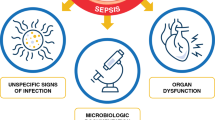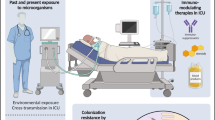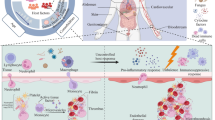Summary
Intensive care patients bear a high risk to manifest “systemic inflammatory response syndrome (SIRS)”, sepsis, septic shock and multiple organ dysfunction which are associated with a high mortality rate. As a consequence of an initial infection or trauma, a hyperinflammatory activation of the immune system follows and an anti-inflammatory response (named “compensatory anti-inflammatory response syndrome (CARS)” occurs consecutively. This latter state manifests as systemic immune dysfunction, anergy and causes increased susceptibility to infections. Results of clinical and experimental studies are discussed providing evidence for the use of a hematopoietic growth factor named granulocyte colony-stimulating factor (G-CSF) to counteract this immunodeficiency. In non-neutropenic, posttraumatic/postoperative patients with an increased risk of sepsis, G-CSF increases neutrophil count and function and decreases the incidence of sepsis. Moreover, recent studies suggest that G-CSF contributes to an anti-inflammatory cytokine response in hyper-inflammatory states and is considered as a promising therapeutic agent given prophylactically. Thus, G-CSF may activate neutrophils on the one hand and at the same time may counteract progression of an excessive inflammatory reaction due to anti-inflammatory effects on the other hand. In this context, G-CSF treatment appears to be a promising therapeutic option in intensive care patients at risk of sepsis, SIRS, CARS and the “mixed antagonistic response syndrome (MARS)”. Regarding effective therapy of hyperinflammatory states of sepsis, SIRS and MARS as well as the secondary, transient immunodeficiency of CARS and MARS by G-CSF, the drug will have to be administered to accurately defined patient groups and due to optimal timing and dosage schedules.
Zusammenfassung
Intensivtherapiepflichtige Patienten sind hochgradig gefährdet, ein „Systemic Inflammatory Response Syndrom (SIRS)“, eine Sepsis, einen septischen Schock sowie eine Multiorgandysfunktion zu entwickeln, die mit einer hohen Letalität verknüpft sind. Auf eine Infektion bzw. auf ein Trauma größeren Ausmaßes reagiert das Immun-system mit einer pro-inflammato-rischen Reaktion, der eine, ebenfalls oft überschießende, anti-inflammatorische Reaktion folgt. Diese kompensatorische, anti-inflammatorische Reaktion wurde als „Compensatory Anti-inflammatory Response Syndrome (CARS)“ bezeichnet. Letzteres manifestiert sich als systemische Immundefizienz, Anergie und resultiert in einer erhöhten Infektanfälligkeit. Klinische und experimentelle Studien weisen darauf hin, daß ein hämatopoetischer Wachstumsfaktor, der Granulozyten Kolonie-stimulierende Faktor (G-CSF), dieser Immun-defizienz entgegenwirken könnte. Die Gabe von G-CSF erhöht bei nicht-neutropenischen, postoperativen und posttraumatischen Patienten mit hohem Sepsisrisiko die Granulozytenzahl, steigert deren Funktionsleistung und senkt die Inzidenz einer Sepsis. Darüberhinaus gibt es Hinweise, daß G-CSF in hyperinflammatorischen Situationen zu einem anti-inflammatorischen Zytokinreaktionsmuster beiträgt und damit als prophylaktisches Therapeutikum geeignet ist. Somit könnte G-CSF einerseits neutrophile Granulozyten aktivieren und andererseits aufgrund der anti-inflammatorischen Effekte gleichzeitig einer überschießenden Entzündungsreaktion entgegenwirken. Unter diesen Gesichtspunkten ist die G-CSF-Gabe als eine vielversprechende Therapieoption bei intensivtherapie-pflichtigen Patienten mit erhöhtem Sepsisrisiko, mit manifester Sepsis, SIRS, CARS und dem sogenannten „Mixed Antagonistic Response Syndrome (MARS)“ anzusehen. Um eine effektive Therapie sowohl der hyperinflammatorischen Phasen bei Sepsis, SIRS und MARS als auch der sekundären, transienten Immundefizienz bei MARS und CARS mit G-CSF zu erzielen, wird G-CSF einer geeigneten Subgruppe von Patienten und gemäß eines optimalen Zeit- und Dosierungs-Schema appliziert werden müssen.
Similar content being viewed by others
Author information
Authors and Affiliations
Additional information
Eingegangen: 6. Mai 1997 Akzeptiert: 22. September 1997
Rights and permissions
About this article
Cite this article
Weiss, M., Schneider, E. Rekombinanter, humaner Granulozyten Kolonie-stimulierender Faktor (rhG-CSF) zur Therapie von Patienten mit SIRS oder Sepsis mit transienter bzw. persistierender Immundysfunktion (MARS, CARS). Intensivmed 35, 22–33 (1998). https://doi.org/10.1007/s003900050115
Issue Date:
DOI: https://doi.org/10.1007/s003900050115




